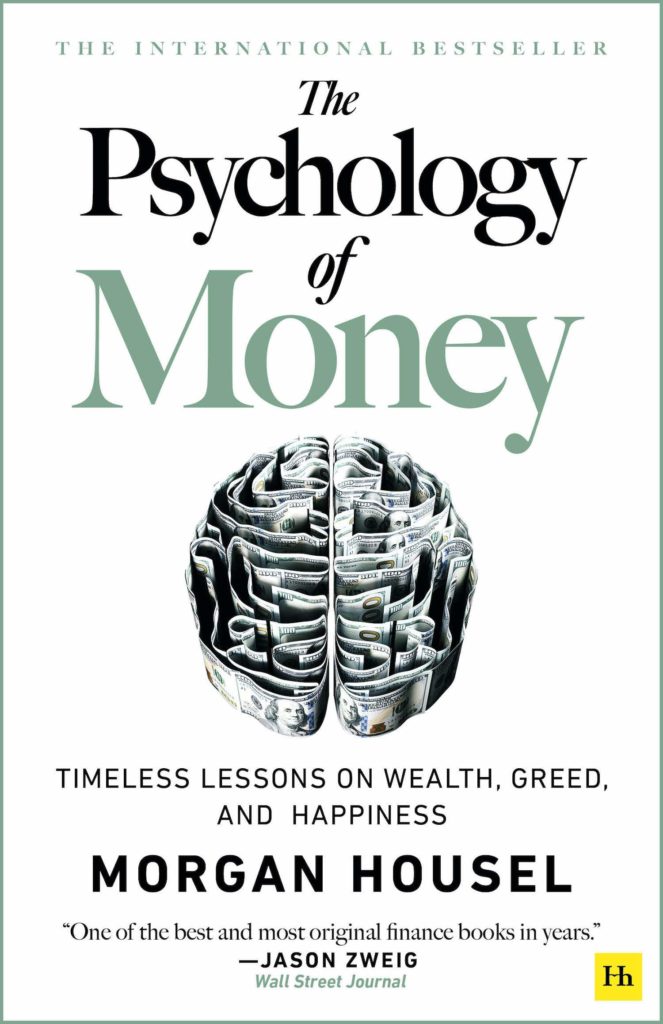The Psychology of Money summary

Book: The Psychology of Money by Morgan Housel
Getting wealthier requires a delicate balance between prudence, humility, moderate optimism, and frugality.
The more I study investing, the more I know what we can’t know about the market, the world, and ourselves. It makes me more prudent when forming opinions in these fields.
Main ideas:
Luck and risk play an important role in the fate of individuals.
- Bill Gates was in one of the first high schools equipped with a computer in the world. His best friend – just as promising as him – died in a mountain hiking accident.
- Luck plays a bigger role than it looks on success.
- Therefore, be careful who you admire and who you look down.
- Focus less on a specific individual story, and more on general patterns.
Investors have different goals and beliefs.
- No one’s crazy. People have different market beliefs, different risks estimation, and value things differently because they have grown in a different country, different era, inflation, interest rate, financial crisis, war, etc.
- Assets valuation is mostly based on stories people tell themselves and their preferences for products and services, both unstable variables highly affected by mood and emotions.
- Different time horizon leads to very different valuation. The 30 years long-term investor will value assets with discounting cash flow valuation method, while for the intraday trader the underlying asset is irrelevant. In a high bull market, nearly all assets only make sense for traders.
- Some people have the unconscious belief they will be loved more if they show off luxuries. Don’t fall into the trap of competing with them.
You can’t know what will happen. Stay prudent.
- You need a margin of safety. Russian roulette is not statistically dangerous but has an unacceptable risk of life loss.
- It’s ok to chase risk but stay away from risks of ruins.
- Leverage and margin are deadly dangerous.
- There are fatal risks that can’t be predicted. During WW2, a bunch of mice ate the electric cables of a group of 80 germans tanks parked somewhere, immobilizing them at a critical time.
- Too many people want to be fully invested in a bull market, sometimes even with leverage, and then panic sell during the next crisis.
- Panic selling happens when the average American fears he will lose his children’s college savings.
- Money is in the length of uninterrupted compounding. Time is the key.
Making money and keeping it requires different mindsets
- To make money, you have to put yourself out there, take calculated risks and be optimistic.
- To keep money, you have to be frugal, paranoïc in the short-term and yet optimistic over the long term.
- In both cases, it also requires humility, because you also needed some luck.
Be careful with history and pessimism
- History can be misleading because even if something looks a lot like a past event, the new version will probably be 20% different, and history doesn’t prepare for this small but significant difference.
- Human psychology is much more predictable than trends, industries, causal relations, etc. which explains why history looks similar but a bit different each time. But it doesn’t help in predicting when major events will happen. Unstable situations can be longer than we think, and stable ones shorter.
- Pessimism sounds smarter and more plausible than optimism because danger and high stakes catch attention.
- Pessimism doesn’t take into account how the market adapts with equal magnitude.
- Negative outcomes can be less probable than they look because we tend to believe what we want to be true.
- Some investment newsletters are prophets of doom even if the stock market had a 17000 folds return over a century.
- Forecasts are unreliable in markets where the next valuations are based on the previous ones and made by biased humans, but we crave these forecasts to feel in control, even if it’s an illusion.
Stay moderate and flexible. You will change, so don’t make plans too extreme
- We all change. The “End of History Illusion” is that even if we know that we changed, we still continue to underestimate our future changes.
- We should aim for moderation, avoid extreme – savings, free time, commute time, time with family
Happiness requires more than money
- Happiness is the difference between your expectations and what you get in life.
- Therefore:
- Set reasonable expectations. Know how much is enough or it’ll be hard to be happy. Be careful who you compare to because there’s always a richer one.
- Take control of our life
- Have good friends
- Be part of something bigger. Give meaning to your life.
- Spend time with your children. They want you more than your money.